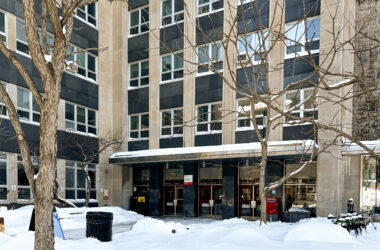The McGill administration’s decision to switch to a self-funded model for its Master of Business Administration program, which would forgo provincial funding by substantially raising tuition, has recently drawn criticism from the provincial government.
McGill’s Board of Governors originally approved the switch to a self-funded program at a meeting in July. Under the current model, tuition and funding from Quebec City provide approximately $12,000 in funding for each student in the MBA program per year. The program costs about $22,000 per student to run, however, leaving a large gap in funding.
“What that gap means is that students elsewhere at McGill are somehow subsidizing MBA students,” said Peter Todd, dean of McGill’s Desautels Faculty of Management. “We just view that as patently unfair.”
Quebec students enrolled in the MBA program currently pay approximately $1,673 per year in tuition. Students from other Canadian provinces pay about $4,676, while international students pay $19,890. Under the self-funded model, tuition for all students will increase to $29,500 in September 2010.
According to Todd, the administration notified the Quebec government of the change after the Board of Governors approved it. In a letter to McGill Principal Heather Munroe-Blum dated January 15, however, Michelle Courchesne, the provincial minister of education, wrote in French that “this type of program or activity requires, under the budget regulations that apply to universities, that the institution that wishes to offer this program must obtain authorization of the ministry.”
Whether this is true is unclear. According to the budgetary regulations issued by the ministry last year, universities with self-funded programs “must obtain authorization from the ministry.” This stipulation, however, does not appear in the new budgetary regulations issued in October.
In her letter to Munroe-Blum, originally published last week in Le Devoir, Courchesne also expressed concern that the self-funded model’s higher tuition “violates the principle of accessibility.”
Todd, however, disagrees. Unlike other master’s students, he said, students who enrol in the MBA program typically have five to six years of work experience and make about $50,000 per year. After graduation, students can expect to make between $80,000 and $90,000 per year.
“It’s a lucrative thing to come and do such a program,” Todd said.
The administration plans to use the revenue generated by the higher tuition to provide the equivalent of $4,000 in aid to each student in the program. That amount is set to rise to $6,000 in the next few years.
“We think that by charging a higher tuition, we can actually make the program more accessible,” Todd said.
The proposed MBA program would not be the first to forfeit provincial funding and employ a self-funded model. McGill introduced a self-funded master’s degree in manufacturing management a decade ago with an annual tuition of $30,000. A self-funded executive MBA program run jointly by McGill and the University of Montreal charges $65,000 for the 15-month degree.
Other Canadian business schools also operate their MBA programs on self-funded models. The Richard Ivey School of Business at the University of Western Ontario charges $64,000 to $74,000 for its one-year MBA program, while the University of Toronto’s Rotman School of Management charges between $74,936 and $94,286 in total for its two-year program.
Todd argued that this higher tuition enables these schools to outperform McGill. According to rankings of MBA programs released yesterday by The Financial Times, McGill’s MBA program ranks 95th in the world. The programs at Rotman and Ivey rank 45th and 49th, respectively.
According to a memorandum sent to members of the McGill’s Board of Governors last week, Munroe-Blum was scheduled to meet with Courchesne on Friday to discuss the issue. Munroe-Blum has also been in contact with the office of Premier Jean Charest.
“We don’t view it as a confrontational situation with the government,” Todd said.
The issue has created some controversy within the Students’ Society, however. Last October, Vice-President University Affairs Rebecca Dooley and Vice-President External Sebastian Ronderos-Morgan introduced a motion at SSMU Council condemning what Ronderos-Morgan called an “enormous tuition hike.” If the administration successfully adopts the self-funded model in one program, he said, it is possible that McGill might make use of it in others.
Council narrowly defeated Dooley’s and Ronderos-Morgan’s motion in the face of strong oppostion from representatives of the Management Undergraduate Society. Undeterred, Dooley and Ronderos-Morgan introduced a broader motion opposing the self-funding tuition model at the Fall General Assembly, which failed to come to a vote after the GA lost quorum.
“We thought it was important for SSMU to have a clear policy against the self-funding tuition model for specialized programs,” Ronderos-Morgan said.
Dooley and Ronderos-Morgan are currently authoring a similar motion in preparation for the Winter General Assembly next month.







